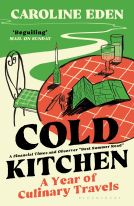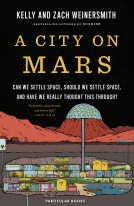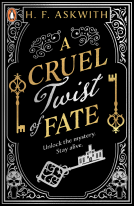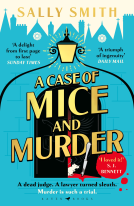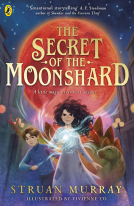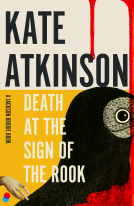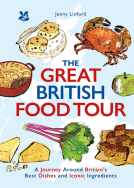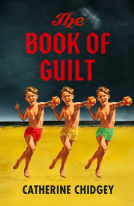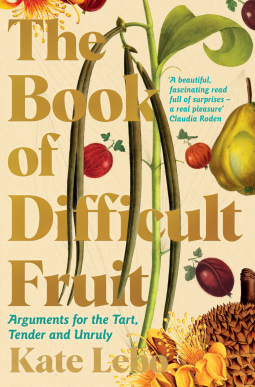
The Book of Difficult Fruit
Arguments for the Tart, Tender, and Unruly
by Kate Lebo
This title was previously available on NetGalley and is now archived.
Send NetGalley books directly to your Kindle or Kindle app
1
To read on a Kindle or Kindle app, please add kindle@netgalley.com as an approved email address to receive files in your Amazon account. Click here for step-by-step instructions.
2
Also find your Kindle email address within your Amazon account, and enter it here.
Pub Date 28 Apr 2022 | Archive Date 28 Apr 2022
Pan Macmillan | Picador
Talking about this book? Use #TheBookofDifficultFruit #NetGalley. More hashtag tips!
Description
‘A richly researched food history, gentle memoir and left-field recipe book.’ i newspaper
‘A dazzling, thorny new essay collection.’ Samin Nosrat, New York Times
‘A beautiful, fascinating read full of surprises – a real pleasure.’ Claudia Roden
‘Inventive and charming . . . profound and deeply felt.’ Buzzfeed
Inspired by twenty-six fruits, essayist, poet and pie lady Kate Lebo expertly blends the culinary, medical and personal.
A is for Aronia, berry member of the apple family, clothes-stainer, superfruit with reputed healing power. D is for Durian, endowed with a dramatic rind and a shifty odour – peaches, old garlic. M is for Medlar, name-checked by Shakespeare for its crude shape, beloved by gardeners for its flowers. Q is for Quince, which, fresh, gives off the scent of ‘roses and citrus and rich women’s perfume’ but if eaten raw is so astringent it wicks the juice from one’s mouth.
In this work of unique invention, these and other difficult fruits serve as the central ingredients of twenty-six lyrical essays (and recipes!) that range from deeply personal to botanical, from culinary to medical, from humorous to philosophical. The entries are associative, often poetic, taking unexpected turns and giving sideways insights into life, relationships, self-care, modern medicine and more. What if the primary way you show love is to bake, but your partner suffers from celiac disease? Why leave in the pits for Willa Cather’s Plum Jam? How can we rely on bodies as fragile as the fruits that nourish them?
Lebo’s unquenchable curiosity leads us to intimate, sensuous, enlightening contemplations. The Book of Difficult Fruit is the very best of food writing: graceful, surprising and ecstatic.
Includes black and white illustrations.
Available Editions
| EDITION | Other Format |
| ISBN | 9781509879267 |
| PRICE | £9.99 (GBP) |
| PAGES | 256 |
Featured Reviews
 Danielle E, Reviewer
Danielle E, Reviewer
I love this book. Not only have I discovered fruit I had never heard of before, I found it fascinating to read about fruit I do know, but a less common where Kate Lebo lives (gooseberries for example).
I dipped in rather than read from cover to cover. In one chapter you might discover the darker side of Juniper Berries, in another how important huckleberries are to a native community. Kate weaves stories from her life with that of the fruit. At the end of each chapter is a recipe or two.
It's a gentle life affirming book that I can't wait to share with others.
I am still thinking about The Book of Difficult Fruit that I finished a couple of weeks back. I enjoy cooking, and am trying to reignite that this year, but I have no desire to pickle or preserve, or learn how to forage on a California trail, and yet, I was enamoured by Kate Lebo’s ability to merge the stories of such foods to her own life. This collection of essays in an A to Z in fruits that you may not have heard of. Throughout she makes deft points on the marketisation of some of these ‘exotic’ fruits, the impact of colonialism on our produce and our taste buds, whilst talking earnestly about the breakdown of a relationship, estranged family ties and learning to garden. Again, it was full of specifics and tangents, of personal stories from a person I do not know, and yet will now think of every time I garnish a drink with a juniper berry, or rifle through the produce at my local asian supermarket.
 Reviewer 850130
Reviewer 850130
I found this book fascinating, not something I would normally have looked at but I really enjoyed reading the rather quirky information and essays on fruit. Sounds strange I know but give it a try.
 Jennifer C, Reviewer
Jennifer C, Reviewer
Lebo effectively uses fruit as a starting point for exploring raw feelings and offering wry observations about her life, friends, and family. Perhaps the most moving chapters are where Lebo turns inward, focusing on her hopes and dreams and how reflecting on the tastes and textures of various fruits has inspired her to write . . . A genre-blending work that will intrigue readers of literary nonfiction, personal essays, or food history.
The Book of Difficult Fruit, contains far more than just exasperating berries; it's a book of 26 essays, but also so much more.
I really enjoyed reading this; I loved the balance between facts, autobiography, history, and recipes.
[I received a copy of this book free from NetGalley in exchange for an honest review]
Readers who liked this book also liked:
Rick Riordan; Mark Oshiro
Children's Fiction, LGBTQIA, Teens & YA
Jenny Linford; National Trust Books
Cooking, Food & Wine, History, Travel


